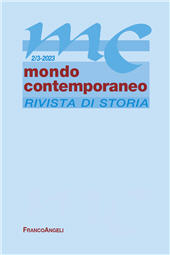2023 - Franco Angeli
Artikel
Digital Version
Herunterladen | Kopieren/Einfügen | Drucken
Fascismo e antisemitismo : l'esperienza della contraddizione
37-51 p.
- Il saggio analizza due contraddizioni che si riscontrano negli studi recenti sull'antisemitismo fascista. La prima riguarda il divario che emerge tra le testimonianze dei protagonisti e la ricostruzione degli storici sulle carte d'archivio: due quadri non coincidenti. Le intenzioni del regime non sempre si tramutarono in atti, per esempio nelle zone occupate. La seconda contraddizione riguarda i numeri. Di tutti i paesi finiti sotto l'occupazione nazista, dopo la Danimarca (0,12%) e la Finlandia (0,35%), l'Italia è il paese con la più bassa percentuale di vittime (17,3%). A spiegare questi numeri, non basta la scarsa consistenza demografica delle comunità italiane o la minore virulenza della polemica antiebraica. Tanto meno convince la lettura in chiave etica.
- A rendere così percentualmente alto il numero di chi trovò salvezza senza emigrare è stato il radicamento e la qualità dei rapporti che gli ebrei avevano saputo intessere nei decenni che seguono l'uscita dai ghetti. Non una spiegazione moralistica, ma è necessaria un'analisi storica sul lungo periodo. [Testo dell'editore].
- The essay analyzes two contradictions found in recent studies on fas-cist anti-Semitism. The first concerns the gap that emerges between the testimonies of the protagonists and the reconstruction of the historians on archive papers: two paintings that do not coincide. The regime's intentions did not always translate into actions, for example in occupied areas. The second contradiction concerns the numbers. Of all the countries that end-ed up under Nazi occupation, after Denmark (0.12%) and Finland (0.35%), Italy is the country with the lowest percentage of victims (17.3%). To ex-plain these numbers, the low demographic size of the Italian communities or the lesser virulence of the anti-Jewish controversy is not enough.
- Even less convincing is the reading from an ethical perspective. What made the number of those who found salvation without emigrating so high in per-centage was the deep-rootedness and quality of the relationships that Jews had been able to weave in the decades following their exit from the ghettos. Not a moralistic explanation, but a long-term historical analysis is necessary. [Publisher's text].
Ist Teil von
Mondo contemporaneo : rivista di storia : 2/3, 2023-
Informationen
ISSN: 1972-4853
KEYWORDS
- Storia della storiografia, ebrei in Italia, fascismo, antisemitismo in Italia, ebrei nel sud della Francia occupata, razzismo e antirazzismo
- History of historiography, Jews in Italy, fascism, anti-Semitism in Italy, Jews in occupied southern France, racism and anti-racism
-
In derselben Datei
- Ricordo di un amico
- Introduzione
- "Marciare e marcire" : a "dekaptych" of the marches proliferating from the events and non-events of 27-31 October in Rome
- Fascismo e antisemitismo : l'esperienza della contraddizione
- Dalla "condizione della donna" alla prospettiva di genere : bilanci e interpretazioni nel centenario della marcia su Roma
- Ambiente e storiografia sul fascismo
- Le parole degli storici : i convegni sul fascismo nel centenario della marcia su Roma
- "Here, There, and Everywhere" : i molteplici voltiascismo nella relatività spaziotemporale
- Al posto del fascismo, l'antifascismo : i best-seller del Centenario
- L'immagine del fascismo nella stampa quotidianaana a cent'anni dalla marcia su Roma
- Le immagini della marcia : la televisione racconta il centenario della marcia su Roma
- I cento anni della marcia su Roma nei social media
- La Russia e le celebrazioni dell'Unità d'Italia nel 1911 : tra diplomazia culturale ed economica
- Nel nome di Maggie?n'analisi della Brexit in prospettiva storica
- Abstracts
- Indice dell'annata


